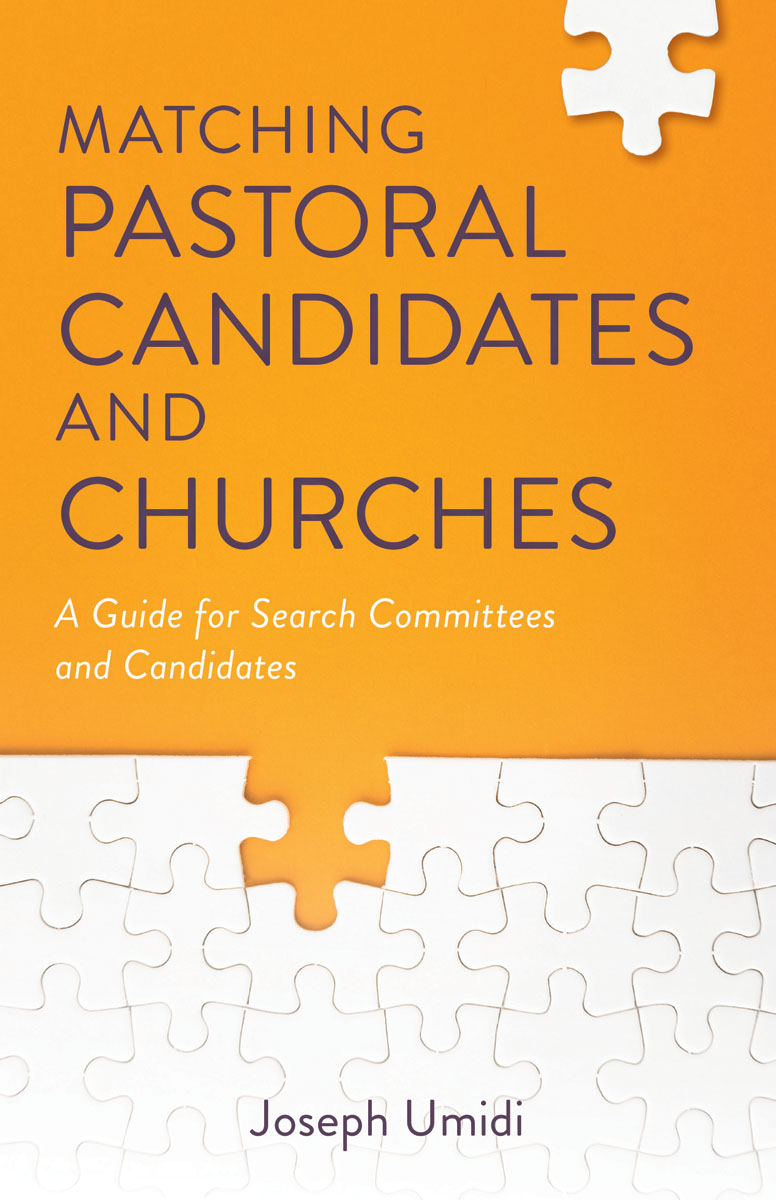

Matching Pastoral Candidates and Churches: A Guide for Search Committees and Candidates
2000, 2020 by Joseph Umidi
Published by Kregel Ministry, an imprint of Kregel Publications, 2450 Oak Industrial Dr. NE, Grand Rapids, MI 49505.
Formerly Confirming the Pastoral Call
All rights reserved. No part of this book may be reproduced, stored in a retrieval system, or transmitted in any form or by any meanselectronic, mechanical, photocopy, recording, or otherwisewithout written permission of the publisher, except for brief quotations in printed reviews.
Unless otherwise indicated, Scripture quotations are taken from the New American Standard Bible. 1960, 1962, 1963, 1968, 1971, 1972, 1973, 1975, 1977, The Lockman Foundation. Used by permission.
Scripture quotations marked NIV are from the Holy Bible, New International Version. 1973, 1978, 1984 by International Bible Society. Used by permission of Zondervan Publishing House. All rights reserved.
Scripture quotations marked NKJV are from The New King James Version. 1979, 1980, 1982, Thomas Nelson, Inc., Publishers.
Library of Congress Cataloging-in-Publication Data
Umidi, Joseph L.
Confirming the pastoral call: a guide to matching candidates and congregations / by Joseph L. Umidi.
p. cm.
Includes bibliographical references.
1. Pastoral search committees. 2. ClergyAppointment, call, election. I. Title.
BV664 U65 2000 254 21dc21 99-043119
ISBN 978-0-8254-4680-1
Printed in the United States of America
1 2 3 4 5 / 27 26 25 24 23 22 21 20
C ONTENTS

INTRODUCTION

T HE W HIRLWIND R OMANCE
S ix months after resigning from his church of sixty-five members, Pastor Steve found himself in a difficult financial bind: emergency funds were dried up and so was his part-time water-filter business. His wife also had just given birth to their sixth child. After months of praying and searching for another pastoral call, he finally saw some light on the horizon. It came in the form of a small country church that almost overnight had grown in attendance from eighty to 320. With little warning, the pastor had resigned to take a megachurch in another city. Now down to 120, and losing members by the week, the little church anxiously asked Steve to come and preach. He was elated. It seemed to be the perfect solution, and just in time.
The next Sunday, Steve preached both morning and evening services under a powerful anointing. Touched by God, several church members came to the altar; others couldnt help remarking on the strong presence of the Lord they felt. The chairman of the elder board said, I havent seen God move like this in years. Later that evening, while Steve was preparing his family for the two-hundred-mile drive home, a hastily convened meeting resulted in the board unanimously extending Steve a call, right there on the spot.
The next day, Steve walked into my office energized, his emotions swirling. After gently bringing him back down to earth, I said something that hit him like a bucket of ice water on a hot summer beach: Steve, long-term relationships arent built on infatuation. They are built on the bonding of common values. The anointing on your message doesnt guarantee that you and the church will have the same mission. Gods gifts, either yours or the churchs, are no guarantee of Gods confirmation. It takes patience and character on the part of both the pastoral candidate and the search committee to wait for God to confirm a call.
Because of our relationship, Steve knew I was not minimizing the importance of the connection between the potential pastor and the congregation by a movement of the Holy Spirit. Church groups that prioritize anointing in the preaching and ministry of their pastors look for this connection with a candidate. However, our research has revealed that churches that rely heavily on the role of the anointed message in the confirmation process do not gain a statistical advantage in the longevity of their new staff over those who emphasize different priorities. In too many cases the process itself is flawed and results in weighing only one or two items too heavily. I proposed to Steve, and now to the readers of this book, a more excellent way.
For the next two hours, I shared with Steve the same guidelines presented in this book. In all my years of personal ministry experience, I have seen repeatedly how a lack of depth in the courtship process leading up to the calling of a pastor to a church results in short-term pastorates that cannot withstand the tests of conflict and stress. Although other authors have touched on some of the elements of a successful pastoral candidate evaluation and preparation method, I have never seen a compilation in one volume of the innovative steps contained in the following chapters.
is written for the benefit of the pastoral candidate. Regardless of which side of the procedure you are on, you should read all sections in order to understand your own role and to see the process from the other sides perspective.
Just as marital disillusionment often is connected to poor premarital preparation, disillusionment and burnout among church leaders stems from poor orworse yetnonexistent candidating procedures. Perfect marriages dont exist, whether between husband and wife or pastor and church, but a well-considered and carefully followed procedure for selecting new leaders (or for a pastoral candidate choosing a new church) can increase the likelihood of creating lasting, vital covenants between churches and their new pastors and staff.
Some would say that simply promoting from within the organization, rather than seeking an unknown quantity from the outside, will eliminate the need to deal with the issues in this book. Unfortunately, the evidence shows that even someone promoted from within can turn out to be a serious mismatch. An associate pastor, for example, who might be well-liked and respected in his present role, may not make a suitable senior pastor in the same organization. Any time a leader changes roles, his compatibility with the new office should be carefully and thoroughly evaluated. Power and position are known to corrupt. The only safeguard is to confirm the call in a leaders life and determine how clearly that call matches the needs of the organization and the specific requirements of the position.
From the perspective of the pastoral candidate, an honest look at how your experience, personality, abilities, and expectations fit a particular organization and role is the most fundamental step you can take to protect yourself and your family from being eaten alive. Stated in a more positive way, a deliberate and thoughtful consideration of your fit within an organization and position increases your chances of finding a church where your gifts and vision can soar.
Even with all the books and articles that have been written about the necessity of a divine call to the ministry, far too many candidates still enter the pastoral vocation without it. Some enter presumptuously, others with innocent or noble-sounding motives; but without a call from God, there is no way to withstand the pressures that come with advancing the kingdom. We cannot call ourselves, and others cannot call us to the ministry. Only God can issue the authentic call that is confirmed by others and evidenced in the fruit of our own fulfillment and sense of destiny.
Next page
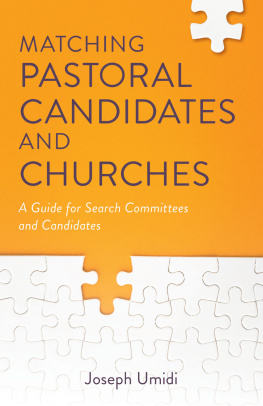

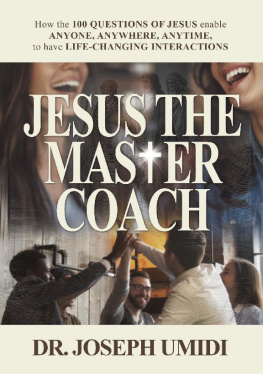


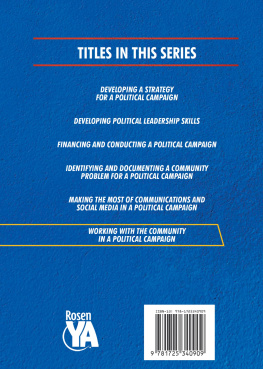


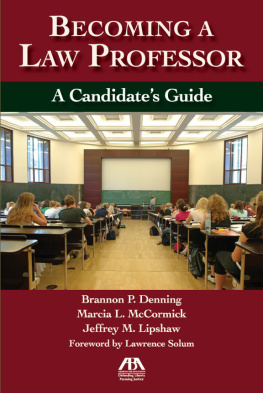
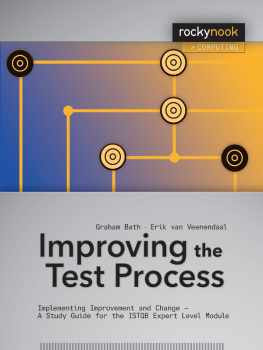


 INTRODUCTION
INTRODUCTION